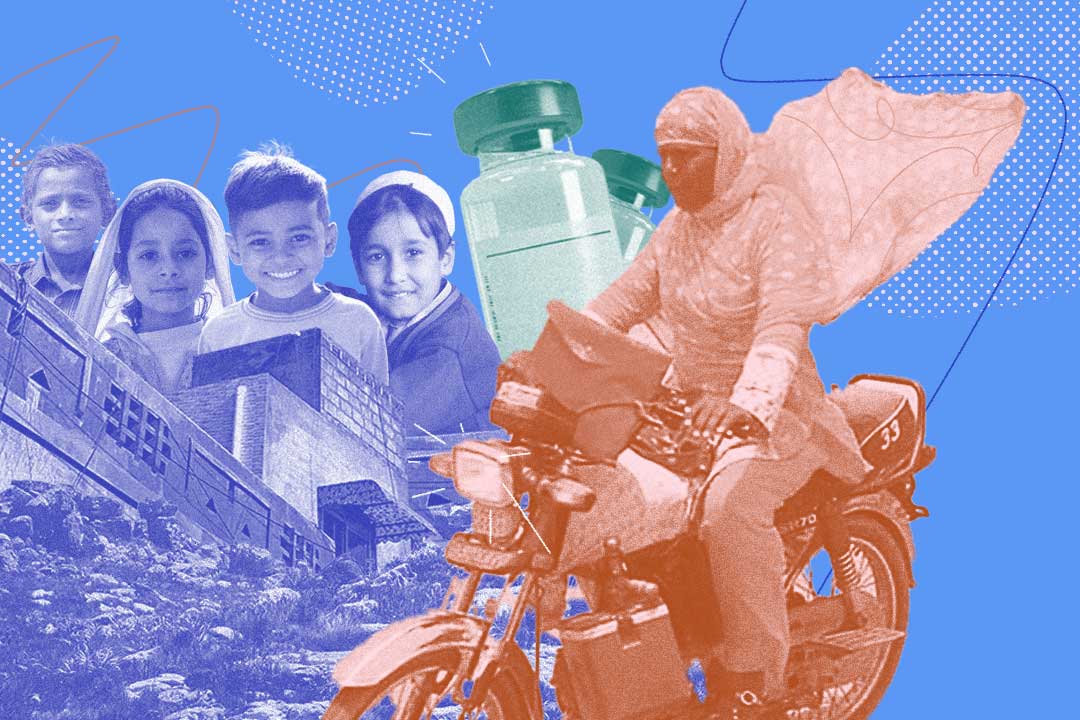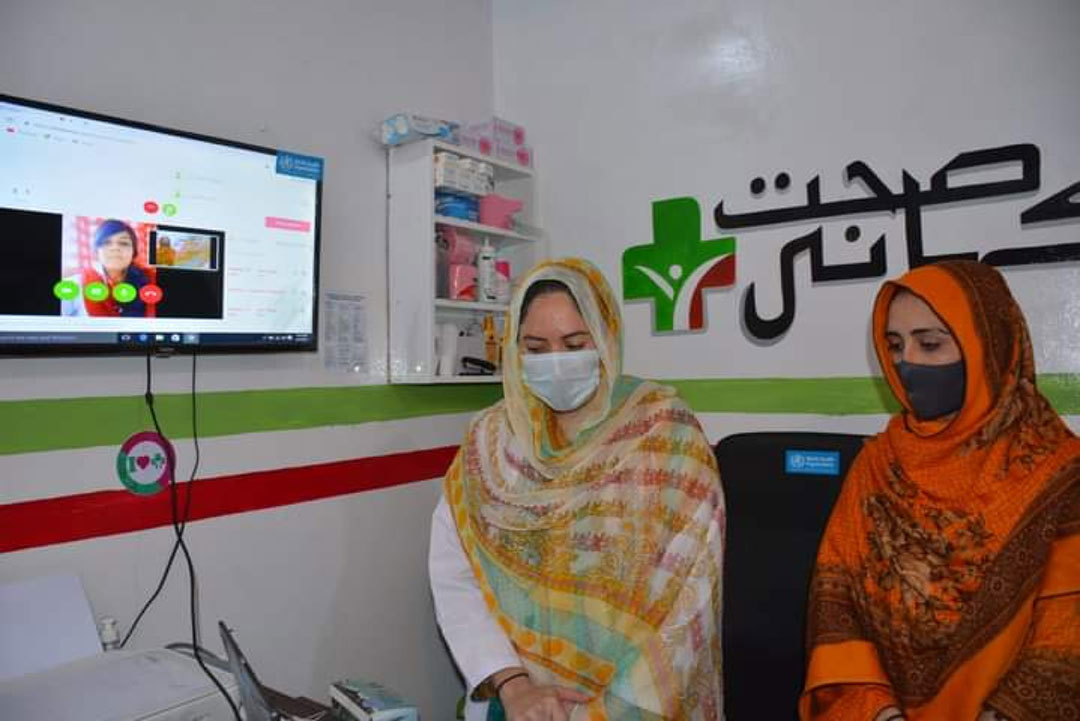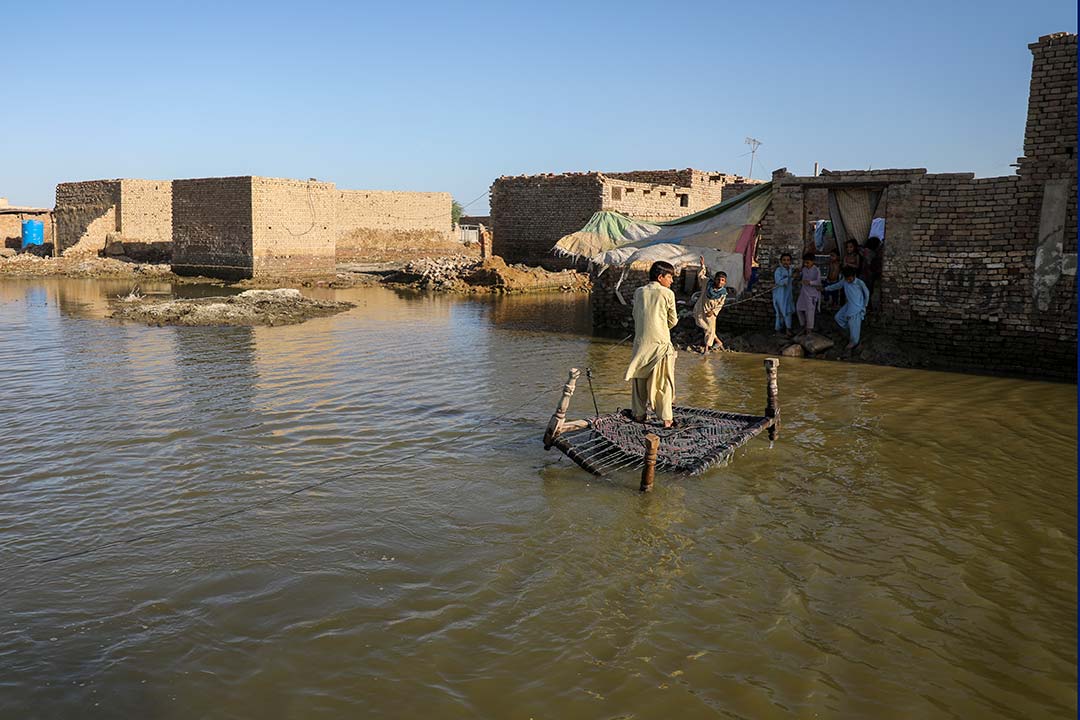Motorbike-riding polio worker ruffles feathers and saves lives in rural Pakistan
Amina Khaskheli discovered she can reach more kids on two wheels than on two feet – so that’s what she’s doing. If the sight of her on her bike has upset some conservative onlookers, it has also inspired more than a few young girls.
- 6 April 2023
- 4 min read
- by Saadeqa Khan

On a scorching morning in June 2016, polio worker Amina Khaskheli woke up early and headed to the local vaccination centre in Matli, a small place some 200km from Karachi. She had slept little after sehri, the pre-dawn meal of the fasting season, and was feeling dizzy with a headache. Nevertheless, she started marching towards a nearby town to conduct an immunisation outreach.
By afternoon, Khaskheli had covered a distance of nearly 15km. The blazing heat outside made it impossible to move forward, and she sank into a faint in a doorway on her rounds. A woman passing by gave her immediate care, and she regained consciousness after a while.
”Over a year or so, I faced harsh criticism and offense from my family and villagers as making myself conspicuous for riding a bike like men. Despite all the backlash and challenges, I kept riding my bike and soon started visiting remote areas of Badin that I could not reach earlier."
– Amina Khaskheli, polio worker
She arrived home unwell. For the next ten days, she recounts, she was unable to go out for fieldwork.
Lying on her bed helpless, she made a life-changing decision. With her father's support, Khaskheli secretly started learning to ride a motorcycle.
Khaskheli, 47, is from Jani Khaskheli, a small village in tehsil Matli of district Badin. The district has rough roads and scarce public transport facilities. She had begun her career as a lady polio worker in 2000, and by 2016, she was a veteran – all but resigned to covering kilometres on foot to reach children, accustomed to both freezing mornings and scorching afternoons.
The motorbike was a personal, not to mention professional, revolution – but not one that everyone readily accepted. "After my father died, I started living with my elder sister. She strongly discouraged me from motorcycle riding because she was afraid of her husband and illiterate in-laws," Khaskheli recounts. "Over a year or so, I faced harsh criticism and offence from my family and villagers as making myself conspicuous for riding a bike like men.

Credit: Amina Khaskheli
"Several women refused to open the door to me to vaccinate their kids. Men were annoyed with me for breaking societal norms and challenging their masculinity. Despite all the backlash and challenges, I kept riding my bike and soon started visiting remote areas of Badin that I could not reach earlier," says Khaskheli.
Have you read?
"Sometimes we need extra courage and patience to push the boundaries forward," she reflects. "I studied up to the intermediate level, but during polio vaccination training, I learned that polio workers should cross every barrier to reach children with life-saving vaccines. And now I'm conveying this message to my colleagues and community workers."

Credit: Saadeqa Khan
"Like most women in our neighbourhood, my mother was also furious with Amina's bold act. But we kids love her, and her motorbike," says Shagufta Bibi, an eighth-grade student at Government Girl High School Matli.
"One of our batch-mates is a polio victim and always needs a companion to walk with. It made us realise that polio makes life miserable, and vaccination is mandatory for every child."
Samina Bano, Shagufta’s class teacher, has observed the harsh criticisms levied at Khaskheli over the past few years. Bano said she found nothing wrong with riding a motorbike to save lives. She says she is teaching her students to take a leaf out of Amina's book - to always try to push the boundaries for a noble cause.
Inspiration for her colleagues
Female workers play a vital role in polio eradication from Pakistan, but in rural areas particularly, social norms can have a powerfully restrictive effect. "Our families and authorities have left us with no other option but to travel miles all day on foot," says Kiran Naz, a polio worker likewise based in Jani Khaskheli.
Women here rarely dare to challenge stereotypes, but gradually, things are changing, and credit goes to Amina.
"I've been working with Amina for eight years and always found her motivating her colleagues. After several years of monitoring field work, now, she is promoted to in-charge of vaccination in our area.
"Her hard work, dedication, and passion made her a role model for young girls in our small town. Women here rarely dare to challenge stereotypes, but gradually, things are changing, and credit goes to Amina. She also offers us pick-up and drop-off to and from the remote areas, and now several other female workers have started learning to motorbike ride."

Credit: Saadeqa Khan
Adeel Jhokio is another polio worker from the same area. He said that Amina's hard work and daring have helped him and his colleagues build trust among local communities, adding, "We found a gradual decline in parents' refusal of vaccination."
Amina now visits far-flung areas in Badin by motorcycle and educates mothers about the significance of polio vaccination. If she's become a symbol of female strength along the road, that's been quite unintentional.








